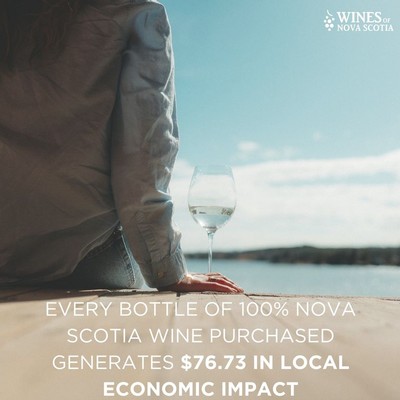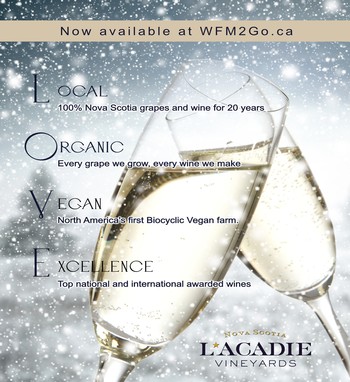L'Acadie Vineyards Blog
Welcome to the L'Acadie Vineyards blog and winery news
Learn how we make our Orange Wine - video
Learn more about our certified Biocyclic Vegan and organic Orange Wine
Learn how we make our Charmat Method Sparkling Wines - video
Visit our sparkling page to learn more about our two charmat method sparkling wines, Joie de Vivre and La Vie en Rose
Learn how we make our Traditional Method Sparkling Wines - video
Learn more about our iconic certified Biocyclic Vegan and organic traditional method sparkling wines
From the birthplace of Nova Scotia sparkling.
Buy Canadian, buy organic
Support your Local Economy
Did you know that when you purchase a bottle of our wine, made with 100% Nova Scotia grown grapes, you're contributing $76.73 to the local economy? Choosing 100% Nova Scotia wines not only supports our economy, but it strengthens and builds upon community growth and development.

Image courtesy of Wines of Nova Scotia
When you purchase from us, you're also supporting the environment. Our certified Biocyclic Vegan and organic wines are made without harmful chemicals or animal byproducts to ensure that you can enjoy our signature Nova Scotia wines with 100% transparency.
Other Organic Canadian Producers
Here are a few of our family favourite Canadian organic farmers, companies, and stores:
- Medford Farms, Canning
- Cochrane Family Farms
- EOS, Wolfville
- Organic Earth Market, Halifax
- Luminate Market, Halifax
- Just Us Coffee, Wolfville
- TAN Coffee. Wolfville
- Made With Local, Nova Scotia
- Cove Kombucha, Nova Scotia
- Organic Matters, Vancouver
- Earth’s Own, Vancouver
- Elan
- La Milanaise
- Söta
- Healtea
- Nuts to You
- One Degree Organics
- Nature’s Path
- Natur Source
- Gaia Organic Seeds
- Camino
- Cha’s Organics
- Sprague Soup
- Nuts For Cheese
- Skin Essence Organics
- Carina Organics
Grower sparkling wine - our model
Our provincial liquor store has many sparkling wine options from large companies such as from Champagne but rarely will you find a Grower Champagne – small scale producers preserving family farming traditions and growing the grapes that go into the bottle. Our grower sparkling winery in Gaspereau, Nova Scotia parallels these interesting French wines.
Large sparkling wine brands such as Veuve Clicquot, Moet and Mumm buy most of their grapes from contracted growers for large scale bottle production shipped around the world. This disconnect is the main difference with grower sparkling wines.
Terroir
You create a sense of place, or terroir, in a wine when you focus on a single vineyard. For example, grapes for our Prestige Brut Estate are always sourced from the same vineyard block with 20 cm topsoil over an ancient seabed- a unique composition of slate, schist and sandstone gravels. These wines have minerality and slight saline characters that international wine judges have identified and awarded. Grape growing is thus extremely important since grapes that we nurture are transparently showcased for judge and consumer approval.
Sustainability
We farm organically – we understand the quality stakes and we want to preserve our land for family succession. Our organic vineyard has been organic since inception 20 years ago and in 2021 we achieved another level of sustainability - certified Biocyclic Vegan, soil to glass. We grow grapes with cover crops for regenerative agriculture and living soils, plant-based teas and no animal manures, and encourage biodiversity. Organic wines express their terroir better than chemical dependent vineyards.
Recently disgorged
Disgorging is the last process of sparkling wine production to remove yeast from the bottle, add dosage (sweetened wine), insert the cork and wire cage, and get ready to release the new vintage. Bottles usually rest on cork for about a month to marry flavours with dosage before release. Large sparkling wineries distribute their bottles around the world and they sit on cork for several years developing a richer honeyed character. Smaller wineries have the ability to sell bottles direct with less time on cork. These recently disgorged bottles are sought after for their freshness.
Vintage Dated
Large sparkling wineries are well branded and marketed with elevated prices. People buy them for brand recognition. There is a consistent flavour profile by blending reserve wines that are held back from past years. These non-vintage wines differ from vintage-dated grower sparkling wines where the growing season is showcased, and celebrated. Much like how a single vineyard gives a sense of place with unique terroir, vintage dates reflect what Mother Nature offered during that growing season. Winemaking has to be in top form to harness these gifts by deciding on variables such as harvest dates, fermentation temperature, lees contact time and dosage levels added at disgorging for balance.
Now available at Wolfville Farmers' Market online store wfm2go.ca
Excited to announce that our certified Biocyclic Vegan and organic wines are now available at wfm2go.ca, the brilliant online Wolfville Farmers’ Market store for selected local farmers and artisans.
Now more than ever, local matters. We take pride in using only 100% Nova Scotia grapes, and have been doing so for 20 years. To buy local and Canadian is to foster community growth and connection, and we are honoured to join our neighbours and fellow farmers to further advocate for this matter via the Wolfville Farmers' Market.

Wolfville Farmers’ Market was one of our first sales channels when we opened our Gaspereau winery in 2008 and released our much anticipated traditional method sparkling wines — the first of its kind in Nova Scotia. We had a booth every Saturday during the transition from outdoors by the public library to its present indoor location and developed lasting relationships with customers, vendors, and the community. We are so thrilled to be welcomed back to this significant and innovative market and to share our organic and vegan wines at so many convenient locations including Wolfville, Windsor, and the HRM.
Read more about the birthplace of NS sparkling wine, Lightening before the Thunder
Use promo code NSLOYAL10 for 10% off. Orders can be placed weekly before Monday to pick-up on the following Wednesday.
Matching style, variety and soil
20 years of style, variety and soil
This year marks 20 years since we drove across Canada from an established winemaking career in the Okanagan Valley, British Columbia to acquire our piece of paradise in Gaspereau, Nova Scotia. Fallow farm land ready for us to plant the province’s first organic vineyard, and our decisions on wine style and variety are standing the test of time.
Time honoured traditions of old world wine regions dictate suitable varieties and wine styles for individual appellations and sub appellations, usually evolving from trial and error of matching them to intrinsically unique soils and microclimates. We made an informed decision, some might call it bold, in 2004 by drawing upon years of sparkling winemaking experience in the Okanagan Valley that the 30 acres in Gaspereau would produce world class sparkling wine. Our palette: uniquely well-drained ancient seabed gravels covered with 15-30 cm loamy top soil tilted 5% towards north west. The industry mantra at that time was “south slope” but I had been making wine from different slopes for years – south for hot-loving reds, north and east for whites, and quite often struggled with grapes planned for sparkling wine production that were ripening too fast, losing fruitiness and freshness. The slope direction seemed like a good fit and it was the soil, schist, sandstone and slate that sealed the idea of suitability for sparkling wine. Wine flavours are influenced by climate and grape variety, and soil comes in a close third. We anticipated minerality nuances, a proven wine characteristic in great wines of the world, and international judges are noticing.
Decanter World Wine Awards 2018, London, England – 92 points, Silver Medal for 2013 Prestige Brut Estate
Judges’ notes, "A floral, apple nose with chalky lemon and creamy pear on the refreshing, mineral palate."
There was risk that the soil would not retain enough moisture compared to the typical rich clay-loam soils around us but even though the young vines struggled during establishment they grew deep roots for resilience to future climate extremes like drought. That coupled with our living soils encouraged with organic farming practice bodes well for climate change resilience. Roots are supported by colonies of fungus living symbiotically, helping water, nutrient....and flavour uptake.
Read more about Climate change resilience and organic farming
On our many visits to Nova Scotia to visit family before we moved back, we got to know the region’s signature grape variety, L’Acadie Blanc, and we’d talk long into the night about whether and how we could make it into a world-class sparkling wine. There wasn’t a bubble in the province at that time but we saw the potential – freshness, apple, citrus, moderate alcohol. Our second bold decision was initially planting 8 acres of exclusively L’Acadie Blanc for sparkling wine at a time when most of the region was planting multiple varieties for blending versatility and more selection of varietal wines. We foresaw traditional method sparkling wine to be the defining style for our region, in particular, L’Acadie Blanc cuvees.
There have been many milestones in the last 20 years that have proven our decisions,
- 2005 – established Nova Scotia’s first organic vineyard
- 2008 – opened sustainable winery with geothermal heating and cooling and insulated concrete construction
- 2008 – released Nova Scotia’s first traditional method sparkling
- 2008 – Nova Scotia’s first appassimento wines. First releases of Alchemy and Passito from our 5-year appassimento research project with Agriculture Canada and collaboration with Italian researchers.
- 2010 – gold and top scoring sparkling for 2007 Prestige Brut at 2010 National Wine Awards. A first for Nova Scotia.
- 2011 – silver medal for 2007 Prestige Brut at 2011 Effervescents du Monde (Dijon, France) First international sparkling award for Nova Scotia.
- 2015 – silver medal for 2010 Prestige Brut zero dosage at 2015 Effervescents du Monde.
- 2021 - Certified to European Biocyclic Vegan standard, the first farm and winery in North America. Read more about our vegan wines, Why we are Biocyclic Vegan
- 2023 – gold medal, 95 points for 2017 Prestige Brut Estate at 2023 Decanter World Wine Awards. First gold medal for Nova Scotia from Decanter, after earning many silver awards and 92-point designations for previous vintages.
November Sparkling Wine Club
Sparkling Wine Club wine selections for November 2024
Winemaker Bruce Ewert describes wines that Sparkling Club members will be getting in November.
2021 Blanc de Noirs, 2021 Sauvignon Blanc, 2019 Prestige Brut Estate pre-release, 2022 Vintage Cuvee, 2020 Sparkling Rose small lot, 2022 La Vie en Rose charmat method.
All vegan and organic. Join now - choose from four different clubs.

